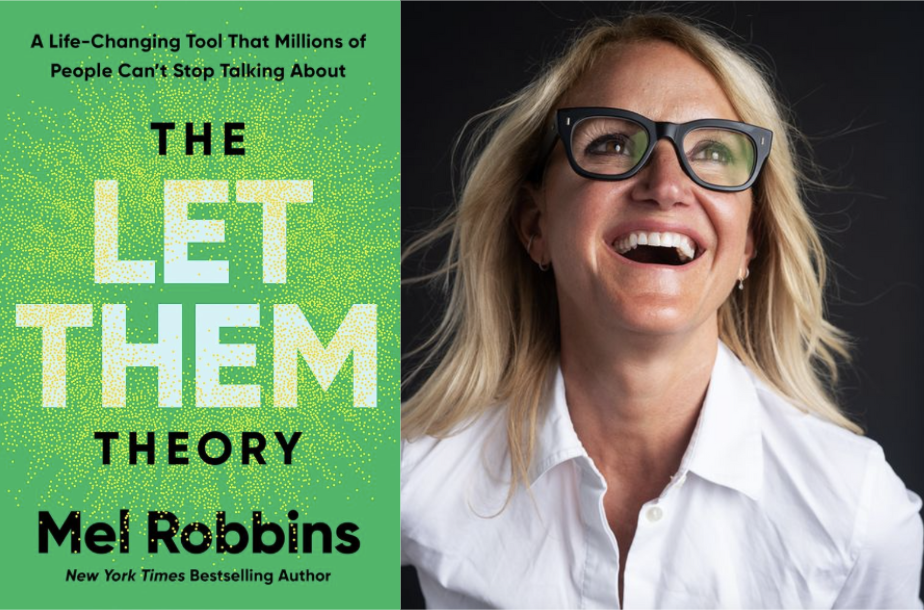
News
Nearly 200 Harvard Affiliates Rally on Widener Steps To Protest Arrest of Columbia Student

News
CPS Will Increase Staffing At Schools Receiving Kennedy-Longfellow Students

News
‘Feels Like Christmas’: Freshmen Revel in Annual Housing Day Festivities

News
Susan Wolf Delivers 2025 Mala Soloman Kamm Lecture in Ethics

News
Harvard Law School Students Pass Referendum Urging University To Divest From Israel
Mel Robbins On Letting Go and Leaning In

There are books that will change the way you think. And then there are books that will change the way you act. “The Let Them Theory,” the latest viral book by podcast host and public speaker Mel Robbins, promises the latter.
Robbins is no stranger to giving advice. And people listen. The host of “The Mel Robbins Podcast,” her show features interviews and advice and is currently the top-ranking production on Apple Podcasts. “The High 5 Habit” and “The 5 Second Rule” — just a few of her previous books — were instant New York Times Best Sellers, while her viral Tedx Talk has 33 million views.
In Dec. 2024, Robbins released her latest book to an audience of readers and followers eager for her insights. Her advice is simple, yet profound. In “The Let Them Theory,” Robbins urges readers to take control of their lives by no longer allowing the expectations and opinions of others to rule their every day.
But how does one actually accomplish this? According to Robbins, through saying two simple words: “Let Them.” Whether it’s not getting invited to a party, getting broken up with, or getting fired, Robbins asks readers to stop focusing their energy on the uncontrollable, external opinions of others by simply “letting” them be.
So where, then, do we direct this new reservoir of energy, no longer wasted on worrying about what other people think? Robbins offers the second part of her theory: “Let Me,” in the form of reaching out to make plans with friends, working on one’s relationship with oneself, looking for a new job, and much more. In other words, Robbins uses her newest book to remind readers that they have the power to control their reactions to the world.
In an interview with The Harvard Crimson, Robbins shared a crystallized version of her advice.
“People are going to say, do, believe whatever they want, and that's not where your power is. Your power is in focusing on your actions and focusing on what you believe. And when you know that you live your life aligned with your values and you know the truth about what you're doing and why, not only do you not concern yourself with what other people are saying — you don’t really think about it much at all,” she said.
Her Boston readers got the pleasure of hearing this advice in person. Robbins delivered a hilarious and perfectly candid talk at a Lisa’s Book Club event at Big Night Live on Jan. 22. In conversation with Lisa Donovan, the founder of Lisa’s Book Club, Robbins shared the countless ways in which audience members could apply the “Let Them” theory to their lives, from dealing with stress and comparison to building friendships and romantic relationships.

However, one of the most interesting case studies that Robbins investigated, both in her book and in the talk, is how to apply “The Let Them Theory” to feelings of jealousy. Robbins shares — through typical tough-love delivery — that jealousy is actually one of life’s greatest teachers and that it can illuminate our greatest desires.
“You are never jealous of something you don’t want. And, if you’re willing to go a little deeper under the emotion of jealousy, whatever you’re jealous of — whether it’s somebody’s health, or somebody’s marriage, or somebody’s relationship with their kids, or somebody’s brand new kitchen, or somebody’s house on Nantucket — if you go a layer deeper, underneath the surface thing, there is something that is deeply tied to your dreams and your values,” Robbins said. “It might be safety, it might be beauty, it might be having enough time to put together a nice outfit, it might be connection with your kids of your family.”
Robbins seems to suggest that the “Let Them” tactic allows us to approach jealousy with curiosity and realize that one of the most stereotypically negative emotions can actually bring beautiful insight into our lives.
“Jealousy is trying to wake you up and organize a level of frustration or anger inside you that you need in order to start working on it. In fact, the single thing that’s required for you to change your life is for you to realize you no longer like the life you’re in,” Robbins said.
While listening to Robbins deliver her message, one feels like they are having a conversation with one of their best friends. Robbins’ advice is so effective because of her delivery style — she strips the formality away from her public speaking, a quality that is often praised yet stiffens the message and separates the speaker from the audience.
Robbins instead shares her theories with a lightness that breathes life back into the self-improvement and leadership literature space. When asked about her speaking style, Robbins shared that this casual delivery is incredibly purposeful and came from years of unlearning a professional and perfected persona that is often taught in higher education.
“Having gone to Dartmouth and Boston College Law School, I was obsessed with being smart,” Robbins said.
Since her days in college and law school, though, Robbins has adopted a new approach to public speaking and gaining the trust and respect of an audience.
“What I’ve come to realize is that I just would rather make things simple and relatable and useful, because that way more people are going to try it, and more people are going to see themselves in it. And it’s taken me a long time to realize just the genius and the impact that you can have when you are not trying to be the smartest person in the room,” Robbins said.
Robbins shares that this new approach to presenting — as a person instead of a performer — opens an incredible space for understanding between the speaker and their audience.
“The research actually shows we don’t admire the smartest person. We actually admire the person that seems the most real. And so if you get nervous or you screw up, or you start a presentation by saying, ‘I’m really sorry, I’m just really nervous, but I’m going to do my best,’ everybody in that room is now rooting for you. Lead with your humanity,” said Robbins.
Robbins may make this conversation-style presentation look easy, but it is not. Despite her impressive speaking career, Robbins still gets nervous and often uses a tried and true method to prepare herself for each talk.
“One trick that has helped me is before I ever get on stage or before I give a presentation, and you can do this in a class, is I say there’s one person in this room who actually needs to hear what I’m going to say, and I’m just going to talk to that one person,” she said.
Robbins can’t change your life. But she can help you look at it in a different way. That is the beauty of presenting this framework — a way of looking at the world that can transform negative opinions into background noise and jealousy into insight. She can’t take away the people who are doubting you. She can’t take away the amount of mental space that you give to these judgments. She can’t take away the negative valence often assigned to jealousy. But she can help you realize the freedom in letting go and the power in leaning in.
—Staff writer Sarah M. Rojas can be reached at sarah.rojas@thecrimson.com.
Want to keep up with breaking news? Subscribe to our email newsletter.
Related Articles
Most Read
- Harvard President Alan Garber Abruptly Cancels Spring Break Trip to India
- Longtime Campus Rabbi Getzel Davis Resigns From Harvard Hillel
- As Trump Slashes Federal Grants, the Harvard School of Public Health Has the Most To Lose
- Harvard Has To Make Up Its Mind About General Education
- Give the Land Up — Or Shut Up
